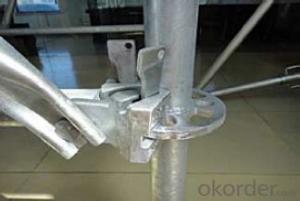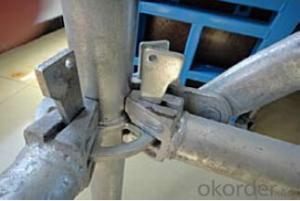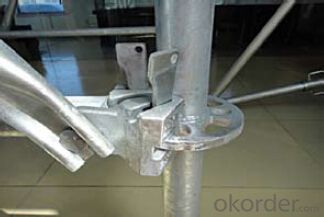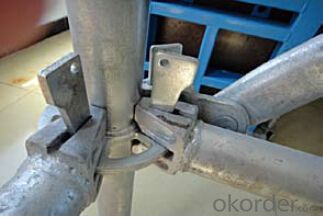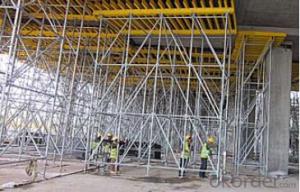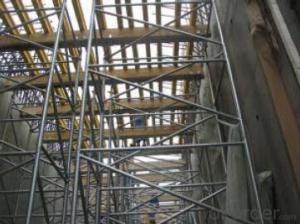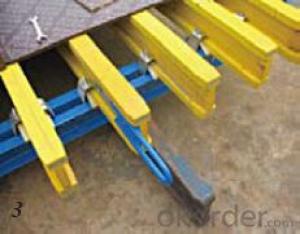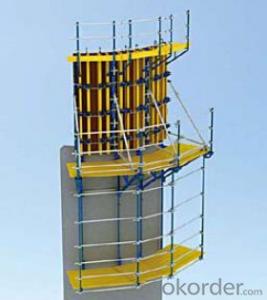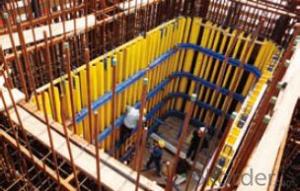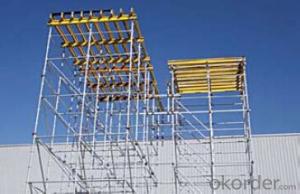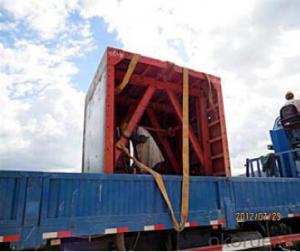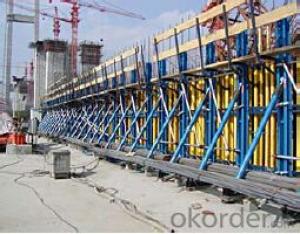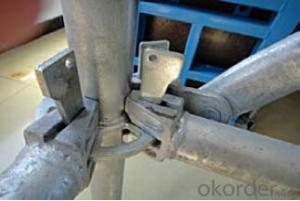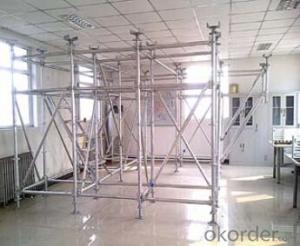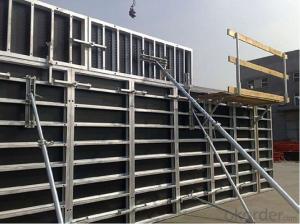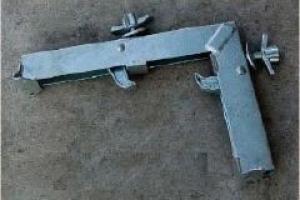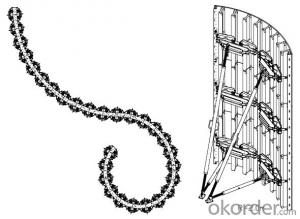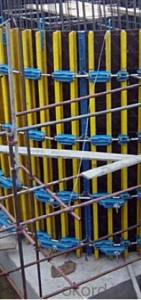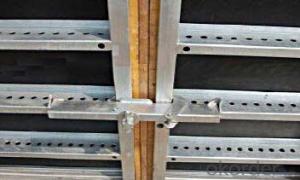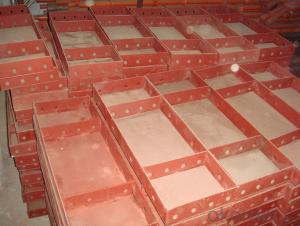Ring-lock Scaffolding Accessories for scaffolding system
- Loading Port:
- Tianjin
- Payment Terms:
- TT OR LC
- Min Order Qty:
- 50 m²
- Supply Capability:
- 1000 m²/month
OKorder Service Pledge
Quality Product, Order Online Tracking, Timely Delivery
OKorder Financial Service
Credit Rating, Credit Services, Credit Purchasing
You Might Also Like
Ring-lock Scaffolding
A support system for construction, ownsadvantages of both cup-lock scaffolding andshoring tower.
It is in the development direction of new typescaffolding.
It is widely used in buildings, bridges, tunnels etc..
Characteristics:
◆ Easy to storage and transportation
◆ High degree of standardization
◆ Easy and quick erection
◆ Excellent stability and bearing capacity
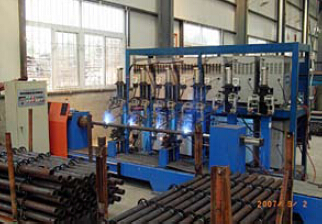
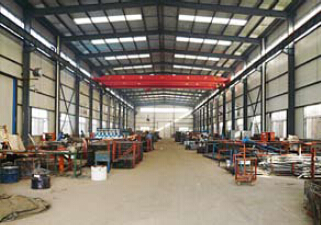
- Q: Can steel formwork be used for both straight and curved concrete elements?
- Yes, steel formwork can be used for both straight and curved concrete elements. Steel formwork is highly versatile and can be easily adapted to different shapes and sizes. It provides a strong and durable framework that can withstand the pressure of the concrete, allowing for the creation of both straight and curved structures.
- Q: How does steel formwork affect the overall material wastage in construction?
- Steel formwork can significantly reduce material wastage in construction. Unlike traditional timber formwork, steel formwork is reusable and durable, which means it can be used multiple times for different construction projects. This reduces the need for constantly buying and disposing of new formwork materials, resulting in less overall material wastage. Additionally, steel formwork provides better dimensional accuracy and stability, minimizing errors and the need for rework, further reducing material wastage.
- Q: How does steel formwork contribute to the overall structural stability of the building?
- Steel formwork contributes to the overall structural stability of a building in several ways. Firstly, it provides a strong and rigid framework that supports the weight of concrete during the pouring and curing process. This ensures that the concrete is evenly distributed and prevents any sagging or deformation. Secondly, steel formwork helps in maintaining the desired shape and dimensions of the concrete elements, such as columns, beams, and walls, which are crucial for the overall stability of the structure. Additionally, steel formwork offers high tensile strength and durability, allowing it to withstand the forces imposed by the concrete and any external loads, thus enhancing the structural integrity of the building.
- Q: Concrete, reinforcing steel for the labor price? 18 storey elevator apartment with a layer of underground carpentry, concrete, steel artificial price. (to the workers to do the Contractor) the problem added: steel, including the production and installation of a full set of artificial ha, concrete is mixed business. Template carpenter??? Concrete with nails??? Steel??? Including machine...Is the area of 10000 square meters of construction area template?How many tons of steel?
- The main body of the wall and inside and outside the powder to the construction area of 70/M2 (including small equipment)10000 square meters of construction area by the consideration of the template to pay two, the need for a template of 10000 square metersThere are about 6~700 tons of rebar
- Q: What are the different types of form ties used in steel formwork systems?
- There are several types of form ties used in steel formwork systems, including coil ties, flat ties, loop ties, snap ties, and wedge ties. These ties are used to hold the formwork together and maintain the desired shape and alignment during the concrete pouring process.
- Q: How does steel formwork affect the overall noise transmission in the building?
- Steel formwork can have a positive impact on reducing noise transmission in a building. Its solid and dense structure acts as a barrier, effectively blocking the transmission of sound waves. Additionally, steel formwork is known for its excellent vibration-damping properties, further minimizing noise transmission. Therefore, by using steel formwork, the overall noise levels within the building can be significantly reduced, resulting in a more peaceful and comfortable environment for occupants.
- Q: What are the considerations when designing steel formwork for industrial facilities?
- When designing steel formwork for industrial facilities, several considerations need to be taken into account. Firstly, the load capacity of the formwork must be carefully calculated to ensure it can support the weight of the concrete during pouring and curing. Additionally, the formwork design should allow for ease of installation, dismantling, and reusability to optimize efficiency and cost-effectiveness. The dimensions and shape of the formwork should be tailored to the specific requirements of the industrial facility, considering factors such as floor heights, wall thicknesses, and column sizes. Moreover, the formwork design should incorporate safety measures to protect workers and prevent accidents. Finally, the choice of materials and surface finish should be suitable for the intended applications and environmental conditions, ensuring durability and longevity of the formwork system.
- Q: What are the different accessories required for steel formwork maintenance?
- The following are the various accessories needed to maintain steel formwork: 1. To maintain the smooth surface of the formwork and prevent corrosion or damage, formwork cleaning agents are used to remove any concrete residue or build-up on the steel formwork. 2. Prior to pouring concrete, formwork release agents are applied to the steel formwork to prevent it from sticking. This makes it easier to remove the formwork once the concrete has cured. 3. Formwork patching compounds are used to fix any damages or imperfections on the steel formwork. This helps maintain the formwork's structural integrity and ensure its longevity. 4. To ensure smooth operation and prevent friction or wear and tear, formwork oil or grease is applied to the moving parts of the steel formwork, such as hinges or sliding mechanisms. 5. Formwork ties and connectors are used to secure the formwork panels together during concrete pouring, ensuring stability. They should be regularly inspected and replaced if damaged or worn out. 6. Formwork wedges and pins are used to align and secure the formwork panels in place. Regular checks should be done to ensure proper positioning and stability. 7. Formwork clamps and brackets are accessories used to support and hold the formwork panels in position. They should be inspected for any signs of damage or weakness and replaced if necessary. 8. To clean the steel formwork and prevent the accumulation of dirt or debris, formwork cleaning tools such as brushes, scrapers, and high-pressure washers are used. 9. Racks, trolleys, or storage containers are used as storage and transportation equipment for the steel formwork. Proper storage and transportation ensure the formwork's longevity and prevent any damage or distortion. In summary, the various accessories needed for steel formwork maintenance are essential for optimal performance, durability, and safety during concrete construction projects.
- Q: How does steel formwork affect the overall construction productivity?
- Steel formwork is a construction technique that utilizes metal panels and supports to create temporary molds or frames for pouring concrete. This method offers several advantages over traditional timber formwork, including enhanced durability, reusability, and flexibility in design. Consequently, steel formwork significantly affects the overall construction productivity in multiple ways. Firstly, steel formwork contributes to increased construction efficiency by reducing the time required for formwork assembly and dismantling. Unlike timber formwork, steel panels are prefabricated and easily interconnected, allowing for swift installation and disassembly. This results in reduced labor hours and faster completion of formwork activities, ultimately accelerating the construction process. Moreover, the durability of steel formwork positively impacts productivity. Steel panels can withstand harsh weather conditions, extreme temperatures, and heavy loads, ensuring their longevity and reusability. As a result, contractors can reuse steel formwork on multiple projects, eliminating the need for frequent replacement and reducing material costs. The ability to reuse formwork not only saves time and money but also minimizes waste generation and promotes sustainability in the construction industry. Additionally, steel formwork offers greater flexibility in design, enabling the construction of complex structures with precision. The modularity and adjustability of steel panels allow for easy customization according to project requirements, resulting in accurate and consistent concrete placements. This precision eliminates the need for excessive concrete rework, reducing material waste and saving construction time. The speed and accuracy provided by steel formwork positively impact overall construction productivity. Furthermore, steel formwork enhances safety on construction sites. Its sturdy structure and secure connections ensure stability during concrete pouring, minimizing the risk of accidents or structural failures. This increased safety reduces downtime caused by injuries or damages, ultimately improving productivity by maintaining a continuous workflow. In conclusion, steel formwork significantly affects overall construction productivity through various means. Its quick assembly and dismantling, durability, reusability, flexibility in design, and improved safety contribute to faster construction processes, reduced material waste, and enhanced efficiency. Embracing steel formwork techniques can lead to significant time and cost savings, ultimately benefiting the construction industry as a whole.
- Q: How does steel formwork contribute to improved construction quality?
- The utilization of steel sheets or panels in the construction technique known as steel formwork is widely acknowledged for its positive impact on construction quality. To begin with, the precision and accuracy offered by steel formwork in shaping concrete structures are noteworthy. The steel panels are precisely manufactured to ensure the desired specifications are met during the construction process. This level of accuracy minimizes the occurrence of errors and inconsistencies, resulting in a construction outcome of superior quality. Moreover, steel formwork exhibits exceptional durability and stability. Unlike traditional wooden formwork, steel formwork can withstand adverse weather conditions, heavy loads, and repeated use without warping or deforming. This durability guarantees the integrity of the formwork throughout the construction process, avoiding any potential issues that may arise from a compromised system. Additionally, steel formwork facilitates faster construction cycles compared to other formwork materials. The ease of assembly and disassembly, coupled with the ability to reuse the formwork on multiple projects, significantly reduces construction time. This efficiency not only saves time for construction companies but also minimizes disruptions to neighboring sites and reduces costs associated with extended construction periods. Furthermore, the use of steel formwork contributes to the enhancement of construction quality by providing a smooth and uniform finish to concrete structures. The seamless mold created by the steel panels eliminates the need for excessive remedial work such as plastering or patching. This results in a visually appealing and aesthetically pleasing final product, which is crucial for projects that require high-quality finishes. Additionally, steel formwork allows for greater flexibility in design and construction. The modular nature of the steel panels enables architects and engineers to effortlessly create complex and intricate structures. This versatility facilitates the construction of unique and innovative designs, ultimately enhancing the overall quality and visual appeal of the project. In conclusion, steel formwork plays a significant role in improving construction quality by offering high precision, durability, efficiency, and flexibility. Its ability to create accurate molds, withstand external forces, reduce construction time, and produce seamless finishes ensures that the final concrete structures meet the highest standards of quality and durability.
Send your message to us
Ring-lock Scaffolding Accessories for scaffolding system
- Loading Port:
- Tianjin
- Payment Terms:
- TT OR LC
- Min Order Qty:
- 50 m²
- Supply Capability:
- 1000 m²/month
OKorder Service Pledge
Quality Product, Order Online Tracking, Timely Delivery
OKorder Financial Service
Credit Rating, Credit Services, Credit Purchasing
Similar products
Hot products
Hot Searches
Related keywords
